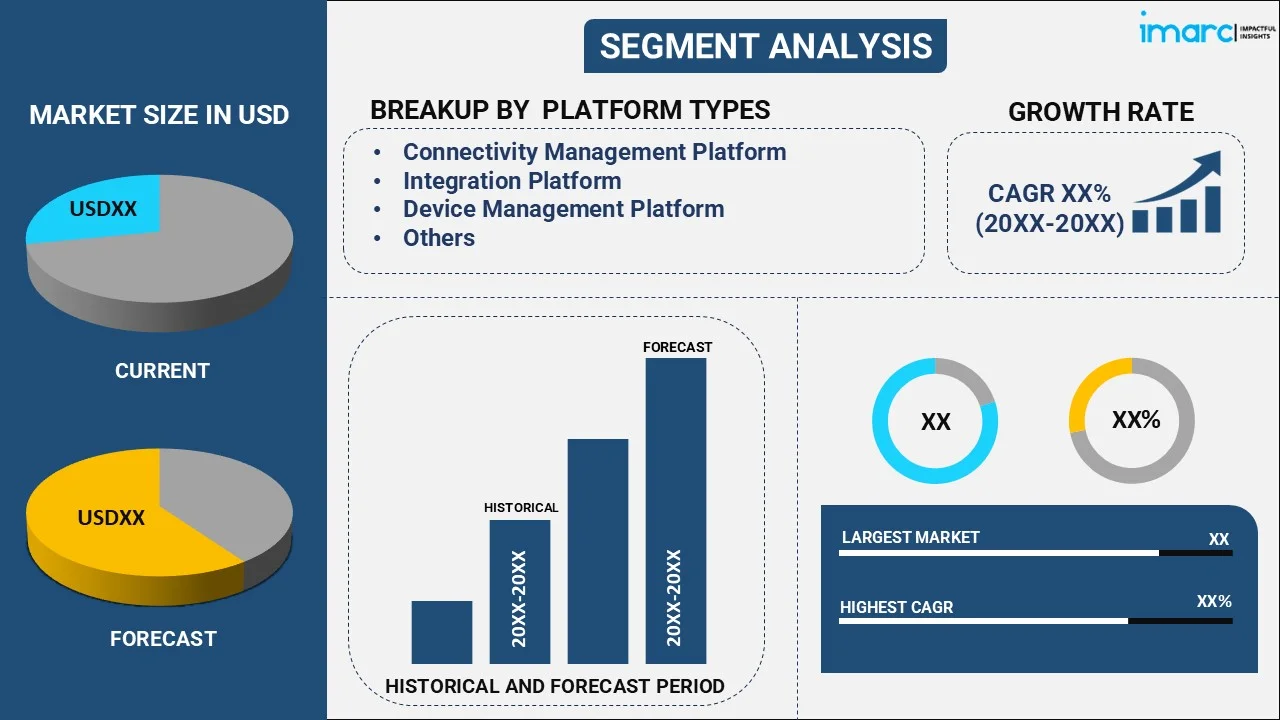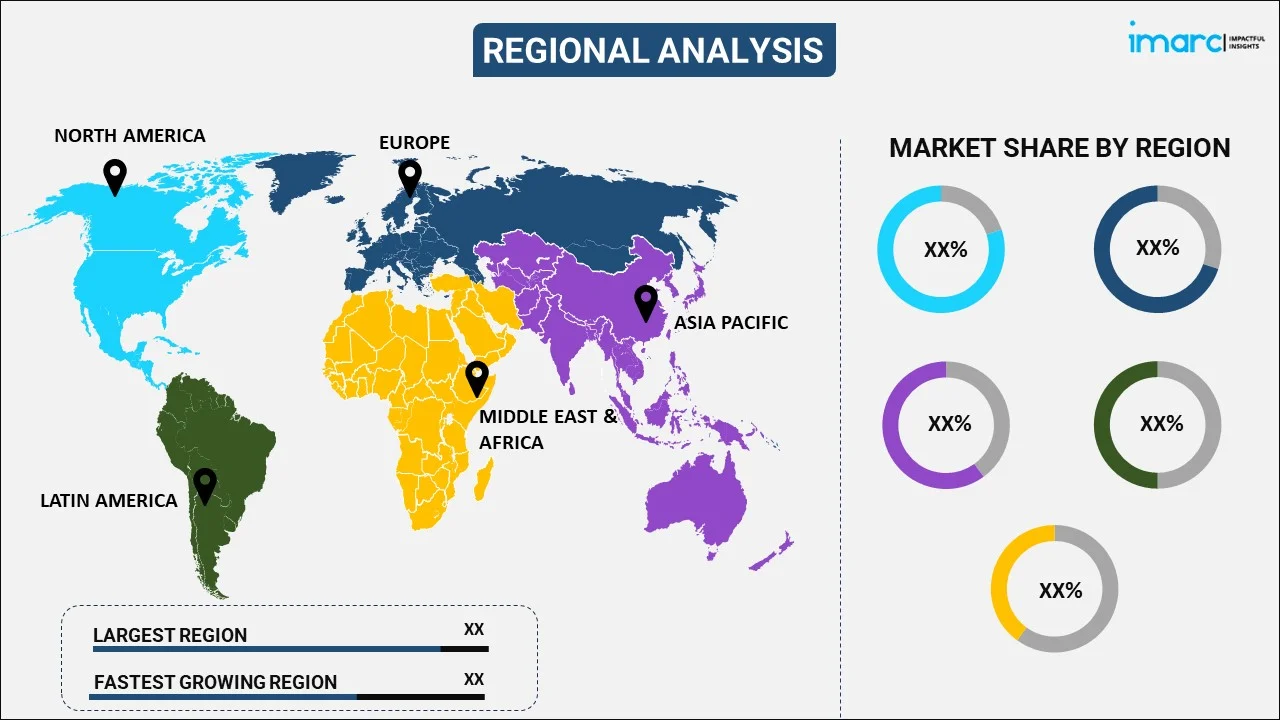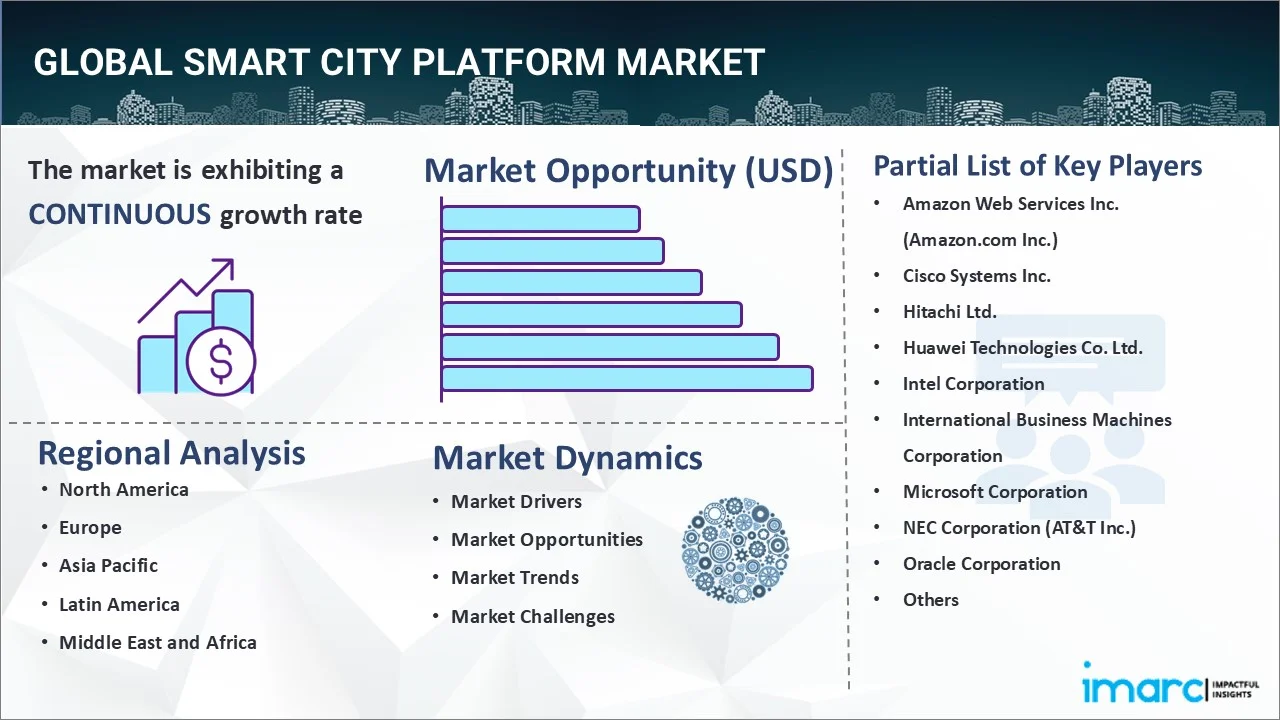
Smart City Platform Market Report by Platform Type (Connectivity Management Platform, Integration Platform, Device Management Platform, Data Management Platform, Security Management Platform), Deployment Mode (On-premises, Cloud-based), Application (Smart Mobility/Transportation, Smart Security, Smart Utilities, Smart Governance, Smart Infrastructure, Smart Healthcare, and Others), and Region 2025-2033
Market Overview:
The global smart city platform market size reached USD 39.9 Billion in 2024. Looking forward, IMARC Group expects the market to reach USD 421.5 Billion by 2033, exhibiting a growth rate (CAGR) of 28.43% during 2025-2033.
|
Report Attribute
|
Key Statistics
|
|---|---|
|
Base Year
|
2024
|
|
Forecast Years
|
2025-2033
|
|
Historical Years
|
2019-2024
|
|
Market Size in 2024
|
USD 39.9 Billion |
|
Market Forecast in 2033
|
USD 421.5 Billion |
| Market Growth Rate (2025-2033) | 28.43% |
Smart cities comprise systems, such as smart lighting, building automation, security and access control, emergency management, intelligent grids, renewable power, water treatment and supply, and transportation. These systems are utilized by smart city platforms to help integrate information from these disparate systems into a unified whole and provide a holistic view of the overall performance and state of the city and its various functions. Smart city platforms can be deployed in a private, public, or hybrid cloud via a remote server or on-premises for analytics, remote asset monitoring, performance management, decision support, and presentation components.
Smart City Platform Market Trends:
At present, there is a rise in the need for sustainable infrastructure on account of the expanding global population and rapid urbanization. This is boosting the adoption of smart cities worldwide, which, in turn, is driving the demand for smart city platforms across the globe. In line with this, governing agencies of different economies are implementing favorable policies and regulations to deploy cloud-based services and facilitate their smart city initiatives. Apart from this, the massive amounts of data generated with the rising adoption of the Internet of Things (IoT) and artificial intelligence (AI) technologies are offering lucrative opportunities for the applications of smart city platforms. These platforms provide context to convert the data generated into actionable, contextualized information that can be used to reduce energy consumption and operational costs. Furthermore, the new generation of smart city platforms offers real economic benefits and the potential to improve the quality of life of citizens while enhancing the natural environment. This is anticipated to influence the market positively in the next few years.
Key Market Segmentation:
IMARC Group provides an analysis of the key trends in each sub-segment of the global smart city platform market report, along with forecasts at the global, regional and country level from 2025-2033. Our report has categorized the market based on platform type, deployment mode and application.
Breakup by Platform Type:

- Connectivity Management Platform
- Integration Platform
- Device Management Platform
- Data Management Platform
- Security Management Platform
Breakup by Deployment Mode:
- On-premises
- Cloud-based
Breakup by Application:
- Smart Mobility/Transportation
- Smart Security
- Smart Utilities
- Smart Governance
- Smart Infrastructure
- Smart Healthcare
- Others
Breakup by Region:

- North America
- United States
- Canada
- Asia-Pacific
- China
- Japan
- India
- South Korea
- Australia
- Indonesia
- Others
- Europe
- Germany
- France
- United Kingdom
- Italy
- Spain
- Russia
- Others
- Latin America
- Brazil
- Mexico
- Others
- Middle East and Africa
Competitive Landscape:
The competitive landscape of the industry has also been examined along with the profiles of the key players being Amazon Web Services Inc. (Amazon.com Inc.), Cisco Systems Inc., Hitachi Ltd., Huawei Technologies Co. Ltd., Intel Corporation, International Business Machines Corporation, Microsoft Corporation, NEC Corporation (AT&T Inc.), Oracle Corporation, SAP SE, Siemens AG and Telefonaktiebolaget LM Ericsson.
Report Coverage:
| Report Features | Details |
|---|---|
| Base Year of the Analysis | 2024 |
| Historical Period | 2019-2024 |
| Forecast Period | 2025-2033 |
| Units | Billion USD |
| Segment Coverage | Platform Type, Deployment Mode, Application, Region |
| Region Covered | Asia Pacific, Europe, North America, Latin America, Middle East and Africa |
| Countries Covered | United States, Canada, Germany, France, United Kingdom, Italy, Spain, Russia, China, Japan, India, South Korea, Australia, Indonesia, Brazil, Mexico |
| Companies Covered | Amazon Web Services Inc. (Amazon.com Inc.), Cisco Systems Inc., Hitachi Ltd., Huawei Technologies Co. Ltd., Intel Corporation, International Business Machines Corporation, Microsoft Corporation, NEC Corporation (AT&T Inc.), Oracle Corporation, SAP SE, Siemens AG and Telefonaktiebolaget LM Ericsson |
| Customization Scope | 10% Free Customization |
| Post-Sale Analyst Support | 10-12 Weeks |
| Delivery Format | PDF and Excel through Email (We can also provide the editable version of the report in PPT/Word format on special request) |
Key Questions Answered in This Report
The smart city platform market was valued at USD 39.9 Billion in 2024.
We expect the global smart city platform market to exhibit a CAGR of 28.43% during 2025-2033.
The rising adoption of smart cities, along with the introduction of new generation smart city platforms, which offer real economic benefits and the potential to improve the quality of life of citizens, is primarily driving the global smart city platform market.
The sudden outbreak of the COVID-19 pandemic has led to the growing deployment of smart city platforms, owing to the increasing digital dependency through IoT and automation solutions for remote asset monitoring, performance management, decision support, etc., during the lockdown scenario.
Based on the platform type, the global smart city platform market has been segregated into connectivity management platform, integration platform, device management platform, data management platform, and security management platform. Among these, connectivity management platform currently holds the largest market share.
Based on the deployment mode, the global smart city platform market can be bifurcated into on-premises and cloud-based. Currently, cloud-based exhibits a clear dominance in the market.
On a regional level, the market has been classified into North America, Asia-Pacific, Europe, Latin America, and Middle East and Africa, where Europe currently dominates the global market.
Some of the major players in the global smart city platform market include Amazon Web Services Inc. (Amazon.com Inc.), Cisco Systems Inc., Hitachi Ltd., Huawei Technologies Co. Ltd., Intel Corporation, International Business Machines Corporation, Microsoft Corporation, NEC Corporation (AT&T Inc.), Oracle Corporation, SAP SE, Siemens AG, and Telefonaktiebolaget LM Ericsson.
Need more help?
- Speak to our experienced analysts for insights on the current market scenarios.
- Include additional segments and countries to customize the report as per your requirement.
- Gain an unparalleled competitive advantage in your domain by understanding how to utilize the report and positively impacting your operations and revenue.
- For further assistance, please connect with our analysts.

 Request Customization
Request Customization
 Speak to an Analyst
Speak to an Analyst
 Request Brochure
Request Brochure
 Inquire Before Buying
Inquire Before Buying




.webp)




.webp)












